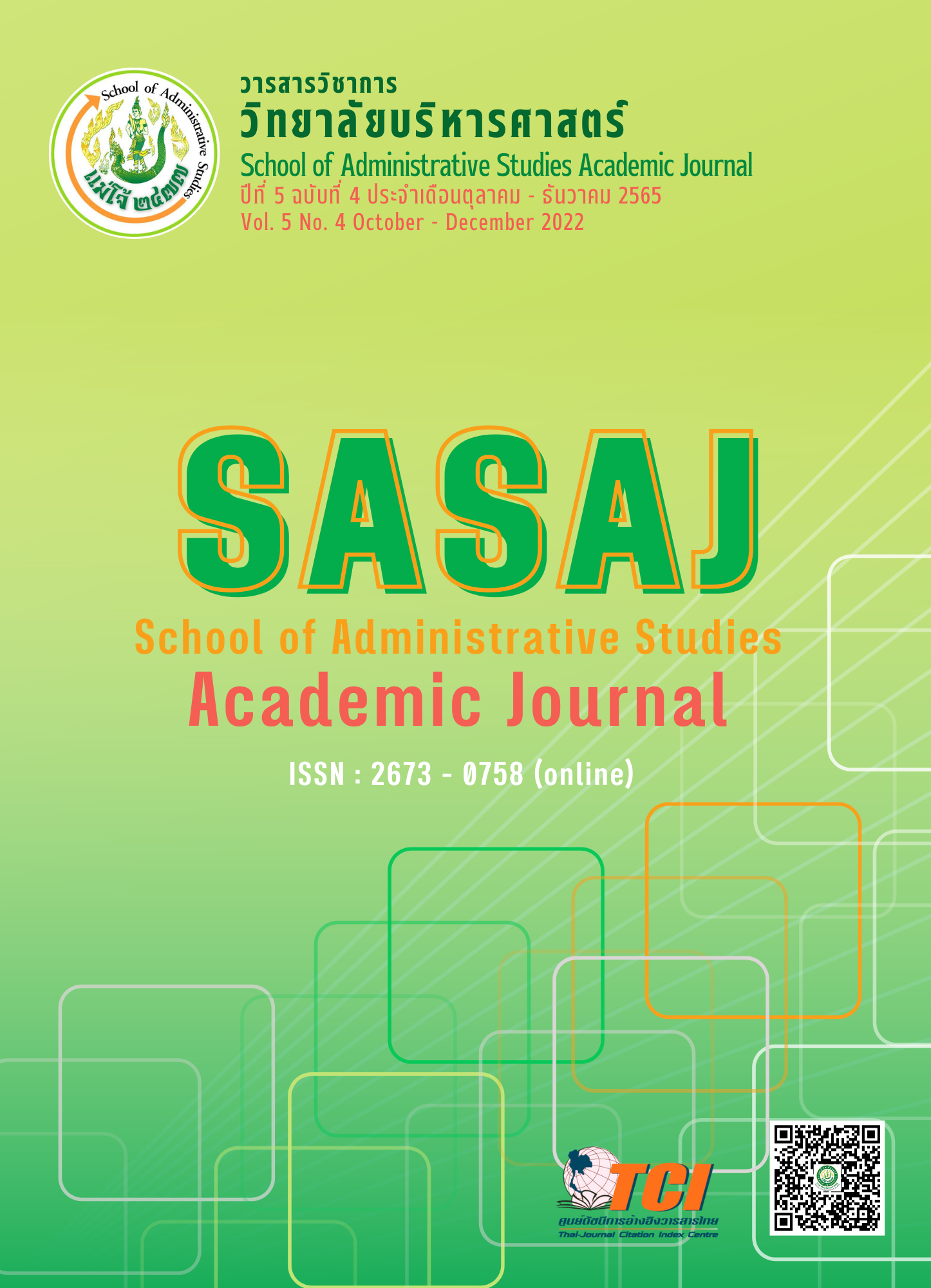อิทธิพลของความเชื่อมั่นในหัวหน้างานและการสนับสนุนจากหัวหน้างานที่มีต่อความผูกพันต่อองค์กรของบุคลากรในอุตสาหกรรมการท่องเที่ยวและบริการฝั่งอันดามันของประเทศไทย
Main Article Content
บทคัดย่อ
บทความนี้มีวัตถุประสงค์เพื่อ 1) ศึกษาระดับความเชื่อมั่นในหัวหน้างาน การรับรู้การสนับสนุนจากหัวหน้างาน และความผูกพันต่อองค์กรของบุคลากรในอุตสาหกรรมการท่องเที่ยวและบริการเขตพื้นที่ฝั่งอันดามันของประเทศไทย 2) ตรวจสอบอิทธิพลของความเชื่อมั่นในหัวหน้างานที่ส่งผลต่อความผูกพันต่อองค์กร และ 3) ตรวจสอบอิทธิพลของการสนับสนุนของหัวหน้างานที่ส่งผลต่อความผูกพันต่อองค์กร ใช้การวิจัยแบบผสมผสานระหว่างการวิจัยเชิงปริมาณและการวิจัยเชิงคุณภาพ เก็บรวบรวมข้อมูลจากกลุ่มตัวอย่างที่เป็นผู้ให้ข้อมูลสำคัญ จำนวน 30 ราย ด้วยการสัมภาษณ์เชิงลึก และบุคลากรในอุตสาหกรรมการท่องเที่ยวและบริการเขตพื้นที่ฝั่งอันดามัน จำนวน 400 คน ด้วยแบบสอบถาม วิเคราะห์ข้อมูลเชิงคุณภาพด้วยการวิเคราะห์เนื้อหา และข้อมูลเชิงปริมาณด้วยการวิเคราะห์สถิติเชิงพรรณนา ได้แก่ ความถี่ ร้อยละ ค่าเฉลี่ย ส่วนเบี่ยงเบนมาตรฐาน และการวิเคราะห์การถดถอยกำลังสองน้อยที่สุด
ผลการวิจัยพบว่า บุคลากรในอุตสาหกรรมการท่องเที่ยวและบริการมีความเชื่อมั่นในหัวหน้างาน การสนับสนุนจากหัวหน้างาน และความผูกพันต่อองค์กรในระดับสูง ในขณะที่ผลการวิเคราะห์การถดถอยกำลังสองน้อยที่สุด พบว่า ความเชื่อมั่นในหัวหน้างานและการสนับสนุนจากหัวหน้างานส่งผลต่อความผูกพันต่อองค์กรของบุคลากรในบริบทที่ต่างกัน นอกจากนี้ ผลการวิจัยเชิงคุณภาพ พบว่า ยังมีอีกหลายองค์ประกอบที่ส่งผลให้พนักงานมีความผูกพันต่อองค์กร ในส่วนของข้อเสนอแนะ หัวหน้างานและสถานประกอบการในอุตสาหกรรมการท่องเที่ยวและบริการ ควรตระหนักและให้ความสำคัญกับการบริหารทรัพยากรบุคคลอย่างจริงจังผ่านแนวคิดการส่งเสริมความผูกพันต่อองค์กร เนื่องจากการบริหารบุคคลที่ดีส่งผลให้องค์กรสามารถรักษาบุคลากรที่มีความสามารถและศักยภาพให้อยู่กับองค์กรต่อไปและเป็นประโยชน์ต่อผลการดำเนินงานในอนาคต
Article Details

อนุญาตภายใต้เงื่อนไข Creative Commons Attribution-NonCommercial-NoDerivatives 4.0 International License.
ลิขสิทธิ์
เอกสารอ้างอิง
Ahmed, U., Majid, A., Al-Aali, L., & Mozammel, S. (2019). Can meaningful work really moderate the relationship between supervisor support, coworker support and work Engagement?. Management Science Letters, 9(2), 229-242.
Alharbi, S. S., & Abuelhassan, A. E. (2020). The impact of trust in supervisor on turnover intention: organizational commitment as a mediating mechanism. International Journal on Recent Trends in Business and Tourism (IJRTBT), 4(2), 1-8.
Ali Ababneh, O. M., Awwad, A. S., & Abu-Haija, A. (2021). The association between green human resources practices and employee engagement with environmental initiatives in hotels: The moderation effect of perceived transformational leadership. Journal of Human Resources in Hospitality & Tourism, 20(3), 390-416.
Alkhateri, A. S., Abuelhassan, A. E., Khalifa, G. S., Nusari, M., & Ameen, A. (2018). The Impact of perceived supervisor support on employees turnover intention: The Mediating role of job satisfaction and affective organizational commitment. International Business Management, 12(7), 477-492.
Brower, H. H., Lester, S. W., Korsgaard, M. A., & Dineen, B. R. (2009). A closer look at trust between managers and subordinates: Understanding the effects of both trusting and being trusted on subordinate outcomes. Journal of Management, 35(2), 327-347.
Carlson, K. D., & Herdman, A. O. (2012). Understanding the impact of convergent validity on research results. Organizational Research Methods, 15(1), 17-32.
De Souza, S. V., & Junqueira, R. G. (2005). A procedure to assess linearity by ordinary least squares method. Analytica Chimica Acta, 552(1-2), 25-35.
Hsieh, C. C., & Wang, D. S. (2015). Does supervisor-perceived authentic leadership influence employee work engagement through employee-perceived authentic leadership and employee trust?. The International Journal of Human Resource Management, 26(18), 2329-2348.
Ibrahim, S. N. H., Suan, C. L., & Karatepe, O. M. (2019). The effects of supervisor support and self-efficacy on call center employees’ work engagement and quitting intentions. International Journal of Manpower, 40(4), 688-703.
Karatepe, O. M. (2014). The importance of supervisor support for effective hotel employees: An empirical investigation in Cameroon. Cornell Hospitality Quarterly, 55(4), 388-397.
Khalifa, G. (2019). Intervening role of supervisor trust and leader-member exchange: an investigation into the role of supervisor support on employee innovative behaviour. Journal of Association of Arab Universities for Tourism and Hospitality, 17(3), 46-67.
Kiryakova-Dineva, T., Kyurova, V., & Chankova, Y. (2019). Soft skills for sustainable development in tourism: the Bulgarian experience. European Journal of Sustainable Development, 8(2), 57-57.
Lather, A. S., & Jain, V. K. (2015). Ten C's Leadership Practices Impacting Employee Engagement: A Study of Hotel and Tourism Industry. Vilakshan: The XIMB Journal of Management, 12(2), 59-74.
Majid, S., Eapen, C. M., Aung, E. M., & Oo, K. T. (2019). The Importance of Soft Skills for Employability and Career Development: Students and Employers' Perspectives. IUP Journal of Soft Skills, 13(4), 7-39.
Ministry of Tourism & Sport. (2019). Tourism Statistics 2019. Retrieved from https://www.mots.go.th/news/category/521
Pattnaik, S. C., & Panda, N. (2020). Supervisor support, work engagement and turnover intentions: evidence from Indian call centers. Journal of Asia Business Studies, 14(5), 621-635.
Qureshi, M. A., & Hamid, K. (2017). Impact of supervisor support on job satisfaction: A moderating role of fairness perception. International Journal of Academic Research in Business and Social Sciences, 7(3), 235-242.
Raza, M. A., Ul-Hadi, N., Khan, M., & Mujtaba, B. G. (2020). Empirical evidence of organizational justice and incivility in the tourism industry: Assessing the moderating role of Islamic work ethics and trust in leader. Journal of Transnational Management, 25(4), 274-299.
Taherdoost, H. (2016). Validity and reliability of the research instrument; how to test the validation of a questionnaire/survey in a research. International Journal of Academic Research in Management, 5(3), 28-36.
Yamane, T. (1973). Statistics: An Introductory Analysis (3rd ed.). New York: Harper and Row Publications.


